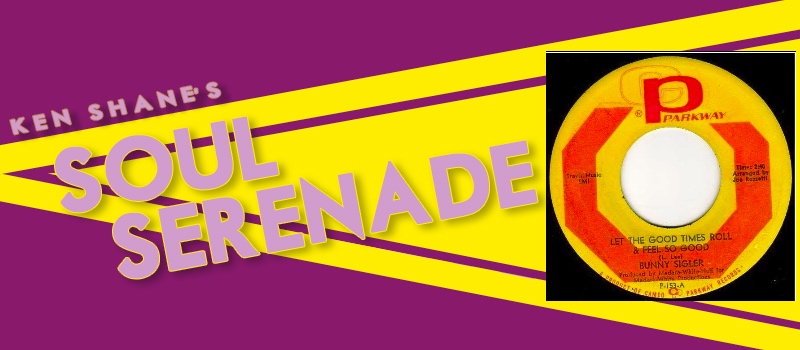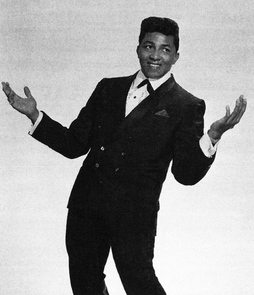 I’m headed back to Philadelphia next week and for me it’s a place where the good times roll. My upcoming trip put me in mind of Bunny Sigler, an early progenitor of Philly Soul who hit it big with his 1967 hit “Let the Good Times Roll/Feel So Good.” The two-song mashup reached #22 in the summer of that year.
I’m headed back to Philadelphia next week and for me it’s a place where the good times roll. My upcoming trip put me in mind of Bunny Sigler, an early progenitor of Philly Soul who hit it big with his 1967 hit “Let the Good Times Roll/Feel So Good.” The two-song mashup reached #22 in the summer of that year.
When Sigler was born in Philadelphia in 1941 his parents named him Walter. But since he was born just two days before Easter, he took on the nickname Bunny almost immediately, and it stuck. His love of music began when he attended his mother’s Baptist church as a child. The church music inspired him to form his own vocal group when he was in high school, and so the Opals were born. The group was a quartet that included Sigler’s brother.
A local DJ convinced Sigler to leave the Opals and set out on his own. He was known as an emotive performer, so much so that the earned the moniker ‘Mr. Emotion.’
“I used to get on stage and start crying with my songs and going down on my knees and so on,” Sigler said.
Sigler’s early recordings didn’t find much success, but he was a popular performer. One summer, after performing at Atlantic City’s Ambassador Hotel, Leon Huff recommended Sigler to producers John Madara and Dave White who had a hit record with Len Barry’s “123.” Madara and White got Sigler a deal with Cameo Parkway, at the time Philadelphia’s leading record label. The team combined two old Shirley & Lee songs, and a hit record was the result. In addition to the single’s success on the Pop chart, it reached #12 on the R&B chart.
Eventually Cameo Parkway folded, but by then Kenny Gamble and Leon Huff were having some success and Sigler began hanging around their office. The problem was that Sigler liked to practice his karate moves in the hallway. In an effort to keep him from frightening people with his kicks and punches, Gamble gave him an office and suggested that he try writing songs with Eugene Dozier.
Gamble and Huff Productions became Philadelphia International Records around 1970. Dozier left the company, and Sigler got his own office. His break as a songwriter came when he wrote songs with Phil Hurtt that ended up on the hugely successful O’Jays album Backstabbers. Sigler also placed a couple of songs on the O’Jays follow-up album Ship Ahoy, including one he had written with Gamble called “Don’t Call Me Brother.”

Sigler became one of the most important figures in the rise of Philly Soul. His productions, songwriting, singing, and piano playing can be heard on dozens of Philadelphia International titles. But Sigler wasn’t done with his own singing career, and in 1972 he went into the studio with the vocal group the TNJs, and their backup band Instant Funk and recorded an album for Philadelphia International. The album spawned Sigler’s first hit since 1967, a remake of the Bobby Lewis hit “Tossin’ and Turnin’.”
There were two more Sigler albums released in 1974, backed for the most part by the MFSB musicians who played on all of the Philadelphia International hits. Sigler also continued his work as a producer, cutting tracks with artists like the Whispers, Ecstasy, Passion, and Pain, and Carl Carlton. He also recorded Curtis Mayfield for Mayfield’s own Curtom label, and recorded his own album for the label.
After a rebellion that saw MFSB musicians like Norman Harris leave Philadelphia International, Sigler signed with Harris’ new label, Goldmind. There, backed again by Instant Funk, he recorded an album that spawned the R&B hit “Let Me Party With You (Party, Party, Party).” Goldmind was distributed by the Salsoul label, and when Goldmind folded, its artists were transferred to Salsoul. Sigler began working with Salsoul acts like Loretta Holloway, Double Exposure, and First Choice. Salsoul also folded, but Sigler soldiered on, producing the hit single “Somebody Loves You Baby” for Patti LaBelle in the early ’80s, and Shirley Jones (formerly of the Jones Girls) #1 R&B hit “Do You Get Enough Love” in 1986.
At the age of 75, Sigler is still active as a writer and producer. Although most of the discussion of Philly Soul centers around Gamble and Huff, and Thom Bell, Sigler’s is certainly a name that should be included in that discussion.





Comments